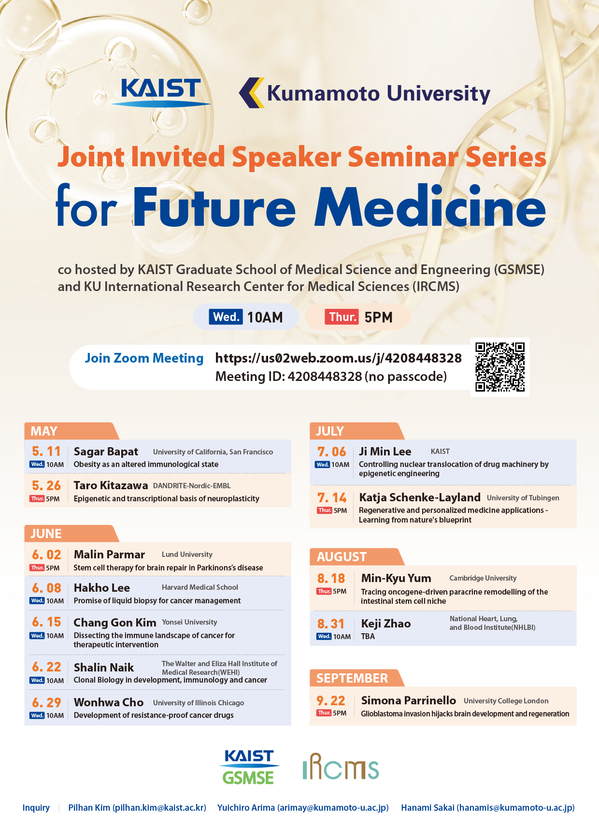- HOME
- News & Events
- [Jul. 14] Joint Invited Speaker Seminar Series for Future Medicine
News & Events
[Jul. 14] Joint Invited Speaker Seminar Series for Future Medicine
June 16 2022
The "Joint Invited Speaker Seminar Series for Future Medicine" will be co-hosted by Korea Advanced Institute of Science and Technology (KAIST) GSMSE and International Research Center for Medical Sciences (IRCMS). It will run from May 2022 to September 2022, with lecture given by scientists who are affiliated with IRCMS or in collaboration with reseachers at IRCMS. The lectures will be given three times a month, in English, and by leading scientists in the relevant research field.
Date : July 14th (Thu)
Time : 17:00 (JST)
Speaker : Dr. Katja Schenke-Layland
University of Tubingen
Title : Regenerative and personalized medicine applications- Learning from nature's blueprint
Abstract:
The "GSCN 2021 Hilde Mangold Award" was presented to Katja Schenke-Layland, director of the NMI Natural and Medical Sciences Institute in Reutlingen and Professor of Medical Technologies and Regenerative Medicine at the Medical Faculty of the Eberhard Karls University in Tübingen. With her scientific work, she has made significant contributions to a better understanding of early human development and has translated her findings into applications for regenerative medicine and tissue engineering. Her research has a strong focus on extracellular matrix (ECM) proteins and how ECM developmentally guides cell fate decisions and impacts human cell physiology and pathophysiology.
In her presentation, Schenke-Layland showed that the basement membrane glycoprotein Nidogen-1 (NID1), identified by her group as a pancreatic niche molecule and an important ECM protein that drives early human cardiovascular development, promotes cell/ tissue survival and regeneration under hypoxic/ ischemic conditions, making it an ideal biomaterial for different applications in tissue engineering and regenerative medicine. For example, she provided insight into how NID1-functionalization can rescue the insulin production of human β-cell-composed pseudo-islets cultured in a pancreas-on-a-chip in vitro model that mimics the ischemic environment post β-cell transplantation. To non-invasively analyze and quantify the cell response and monitor artifact-free phenotypic and functional changes within the in vitro model, marker-independent Raman microspectroscopy, Raman imaging, and fluorescence lifetime imaging microscopy (FLIM)-based metabolic mapping were employed. The data presented suggest that NID1 is a powerful therapeutic candidate that may have multiple clinical applications in the future.
This seminar will be held via Zoom.
Please register at the link below if you would like to participate. https://docs.google.com/forms/d/e/1FAIpQLSenZyyWw2h4XA4GhJUwaoMbZb95CNstqAFWcWkHiN451rDwMg/viewform?usp=sf_link

